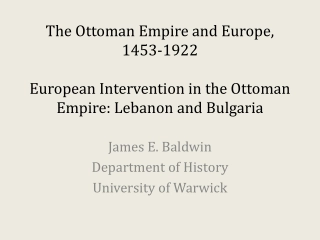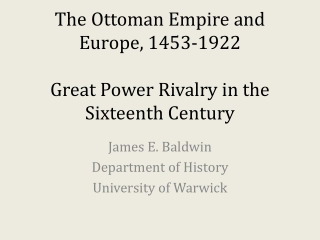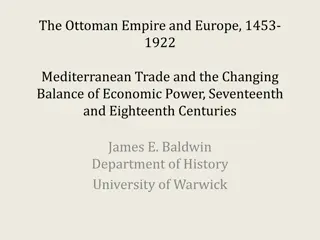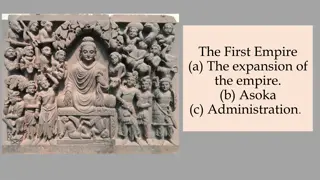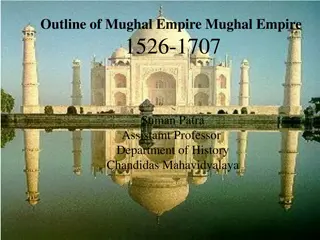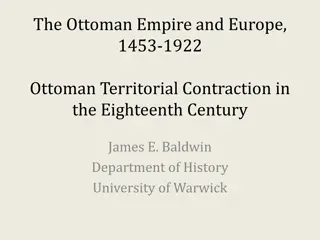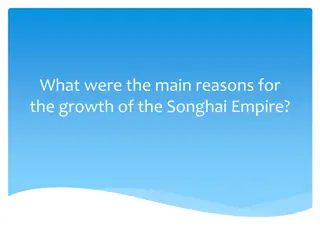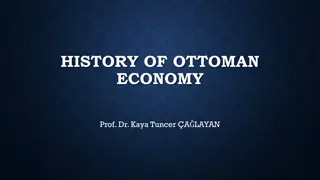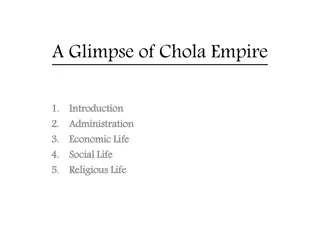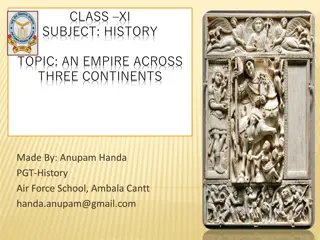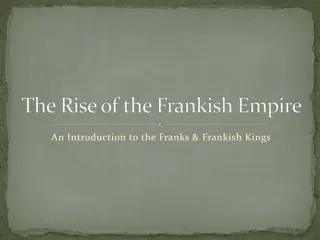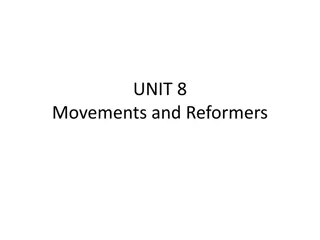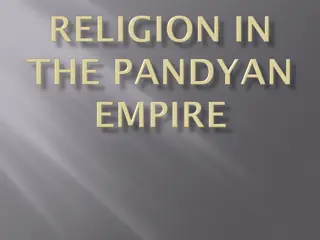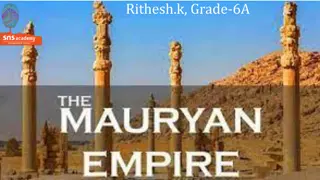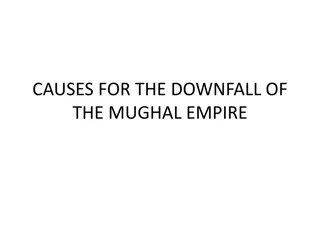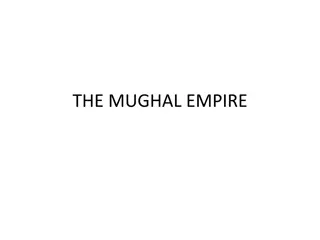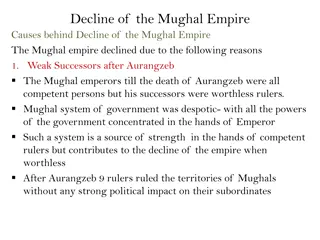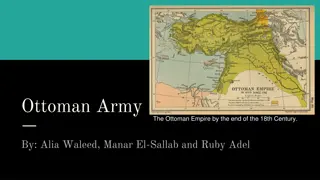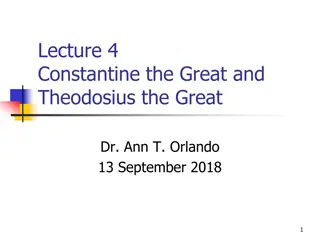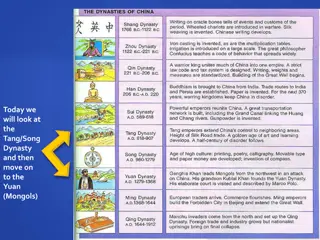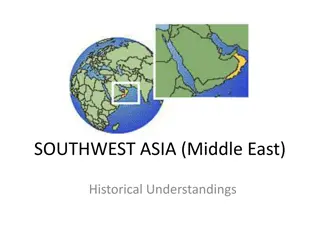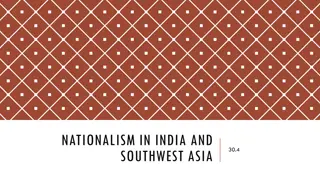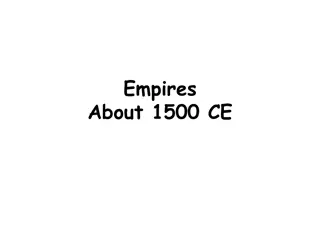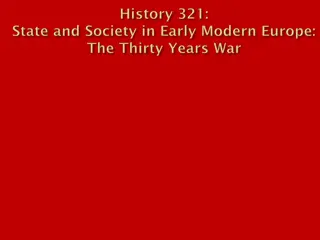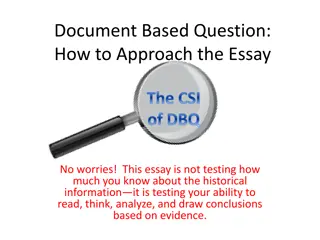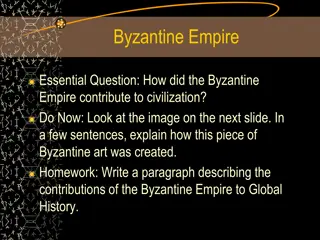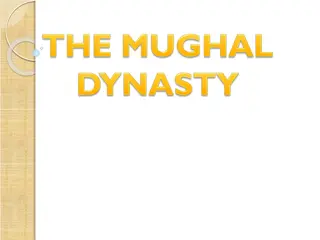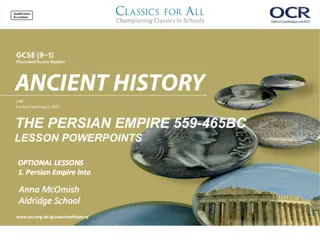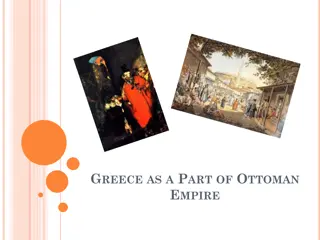European Humanitarian Intervention in the Ottoman Empire
Explore European powers' moral duty to intervene in Ottoman affairs during the 19th century, motivated by humanitarian and imperial interests. Discover the impact of the Concert of Europe and legal theories on humanitarian intervention.
3 views • 22 slides
The Ottoman Empire and Europe, 1453-1922
The interaction between the Ottoman Empire and European powers, including the Habsburgs, Safavids, Mamluks, and Russia, shaped the geopolitical landscape of the 16th century. This period saw Ottoman expansion, clashes between different empires, and complex motivations behind territorial conquests, i
0 views • 16 slides
Reform Efforts in the Ottoman Empire: 18th and 19th Century Transformations
The Ottoman Empire underwent a series of reforms from the late 18th to the 19th century, aiming to centralize power, boost revenues, strengthen the military, educate bureaucrats, refine legal systems, and improve healthcare. Factors driving these reforms included military weaknesses, separatist nati
0 views • 19 slides
Ottoman-European Economic Relations and Mercantilism in the 16th Century
The Ottoman Empire and Europe traded various goods in the 16th century, with a negative trade balance favoring the Ottomans. Institutional innovations like the Joint-Stock Company and the Levant Company emerged to facilitate trade and secure better terms. Mercantilist policies were implemented to re
2 views • 15 slides
Coffee and Orientalism: Exploring the Relationship in the 1700s
Delve into the intriguing history of coffee and its role in shaping the relationship between Europe and the Ottoman Empire around 1700. Learn about the perceived virtues of coffee, the various types in circulation, and the significance of these differences. Images and quotations offer a vivid insigh
1 views • 7 slides
Mauryan Empire: Expansion, Administration, and Legacy of Ashoka
The Mauryan Empire, ruled by Chandragupta, Bindusara, and the renowned Ashoka, witnessed significant expansion and innovative administration methods. Through taxation, infrastructure development, and royal appointments, the empire flourished. Ashoka's reign marked a shift towards peace, public welfa
4 views • 7 slides
Outline of Mughal Empire Mughal Empire 1526-1707.
The Mughal Empire in India from 1526 to 1707 was a significant period marked by notable rulers such as Babur, Humayun, Akbar, Jehangir, Shah Jehan, and Aurangzeb. These emperors each contributed differently to the empire's development, with highlights including military conquests, administrative ref
7 views • 14 slides
Ottoman Empire Territorial Contraction in the 18th Century
Ottoman Empire faced agricultural and fiscal crises in the 17th century, leading to internal rebellions. However, by the mid-17th century, the empire had recovered and experienced further expansion, albeit at a slower rate compared to the previous century. In the 18th century, the Ottomans suffered
2 views • 12 slides
Understanding the Growth of the Songhai Empire
Delve into the factors that fueled the growth of the Songhai Empire in West Africa for nearly 150 years. Explore the key reasons behind its rise to power and the significance of its dominance in the region. Work collaboratively to uncover evidence supporting the various factors that contributed to t
1 views • 6 slides
Writing an Evidence-Based Claim in History: Unraveling the Gupta Empire's Legacy
Delve into the art of crafting an evidence-based claim by exploring the historical context of the Gupta Empire. Understand the significance of formulating a well-supported thesis statement and backing it up with thorough evidence analysis, particularly focusing on the empire's achievements in mathem
0 views • 5 slides
Overview of the Ottoman Empire's Economy and Social Structure
The history of the Ottoman Empire's economy and social structure encompasses its Turkish and Islamic influences, as well as its geographical diversity across regions like Asiatic, East European, and African territories. The empire's centuries-long existence from 1300 to 1918 saw distinct periods of
3 views • 105 slides
A Glimpse of Chola Empire: Rise and Fall of an Ancient Dynasty
The Chola Empire, under rulers like Vijayalaya, Aditya I, and Rajaraja I, witnessed periods of expansion, conquests, and cultural advancements. Their efficient administration, economic prosperity, social structure, and religious practices are discussed, highlighting the empire's zenith under Arumoli
0 views • 11 slides
An Empire Across Three Continents - A Historical Journey
Explore the fascinating history of an empire spanning three continents, from the rise of trade networks in the Assyrian empire to Alexander the Great's conquests and the evolution of Rome into a dominant power. Discover the shared cultures, languages, and sources that illuminate the rich past of the
1 views • 34 slides
The Rise of the Frankish Empire: A Journey Through History
Explore the fascinating history of the Frankish Empire from the conquest of Gaul by the Franks in the 5th century to the reign of Charlemagne as the Holy Roman Emperor. Discover key events such as Clovis I's unification of the Franks, Charles Martel's victory at the Battle of Tours, and Charlemagne'
4 views • 6 slides
Khilafat Movement in India: A Historical Perspective
The Khilafat Movement was a significant event in Indian political history, triggered by the British not fulfilling promises made to protect Turkey during World War I. The movement aimed to safeguard Turkey's holy places, restore its territories, and revive the Ottoman Empire. Despite efforts, includ
0 views • 30 slides
Discovering the Rich History of Hampi: A Glimpse into the Vijayanagara Empire
Hampi, also known as Vijayanagara, holds the remnants of a once grand empire founded in the 14th century. The discovery of this historical site in 1800 by Colonel Colin Mackenzie marked the beginning of unveiling its treasures. From its origins under Harihara I and Bukka I to the golden era under Kr
0 views • 18 slides
Hinduism Flourishing in the Pandyan Empire
Hinduism flourished during the period of the Pandyan Empire, with rulers giving extensive donations to Saiva and Vaishnava temples. They provided endowments for temple renovation and maintenance. Notable rulers like Maravarman Sundara Pandyan and Jatavarman Sundara Pandiya contributed significantly
0 views • 18 slides
Overview of Mauryan Empire: Chandragupta, Bindusara, and Ashoka
Mauryan Empire, established by the Mauryas, was the first major empire in India, encompassing a vast territory and surpassing previous dynasties in land control. Chandragupta Maurya, Bindusara, and Ashoka were key emperors who shaped the empire's history. Chandragupta, supported by Chanakya, conquer
0 views • 13 slides
Government Responses to Economic Change in Qing China and Ottoman Empire
Explore the similarities in government responses to economic change in Qing China and the Ottoman Empire during the late 19th and early 20th centuries. Discover how both empires sought to uphold traditional values amidst global modernization trends, shaping their strategies for economic stability an
0 views • 14 slides
The Impact of the British Empire on Scotland: Lessons and Reflections
Exploring the historical significance of the British Empire on Scotland, this lesson delves into the interconnections between the two entities. It examines various aspects such as population movements, cultural investments, economic influences, and the overall positive impact on Scotland. By investi
0 views • 12 slides
Causes for the Downfall of the Mughal Empire
The decline of the Mughal Empire post-Aurangzeb's reign was due to factors such as religious persecution, the Deccan policies, weak successors, financial difficulties, neglect of sea power, European settlement, and invasions. These political, social, and economic issues contributed to the downfall o
0 views • 9 slides
The Mughal Empire: History and Legacy
The Mughal Empire was founded by Babur, a skilled statesman and conqueror. His military conquests paved the way for the empire's expansion in India. Babur's son Humayun faced challenges during his reign, leading to a period of instability. Despite difficulties, the Mughal Empire left a lasting impac
0 views • 13 slides
Causes Behind the Decline of the Mughal Empire
The decline of the Mughal Empire was influenced by weak successors after Aurangzeb, degeneration of Mughal nobility, inefficiency of the army, economic bankruptcy, foreign invasions, wars of succession, and court factions. The empire faced challenges such as incompetent rulers, weakened military, fi
2 views • 5 slides
Rise and Fall of the Ottoman Empire's Military Power in the 18th Century
The Ottoman Empire's military success in the 18th century was attributed to their expertise in using gunpowder, loyal soldiers, strong organization, multilingual education, and strategic planning. However, the empire faced decline due to dated cultural practices and increasing European power, leadin
1 views • 17 slides
The Transformation of the Roman Empire: Constantine and Theodosius
The lecture delves into the significant reigns of Constantine the Great and Theodosius the Great in the context of the Roman Empire's historical changes. It explores the social and ecclesial impact brought about by Constantine's policies and examines the political landscape during the early fourth c
0 views • 29 slides
Melancholy: The Soul of Istanbul - Chapter 1.5 Theme and Excerpts
Explore the deeply rooted melancholy intertwined with the history and identity of Istanbul. The excerpts delve into the city's transformation post the Ottoman Empire, personal reflections on fate, and the impact of westernization. Discover how Istanbul's melancholic aura shapes the narrator's perspe
0 views • 12 slides
Rise and Legacy of the Mongol Empire
The rise of the Mongol Empire under Genghis Khan, the unification of Mongols, conquests, and the establishment of the Yuan Dynasty by Kublai Khan are highlighted. The Mongols' military prowess, organizational skills, and cultural adaptability led to the largest land empire in history. The Pax Mongol
0 views • 11 slides
European Imperialism in the Middle East: A Historical Overview
Empire of the Turks and the 18th-century Ottoman Empire played significant roles in the power dynamics of the region, with conflicts over control of the Black Sea and territories. Napoleon's expedition into Egypt further intensified European interest in the Middle East, impacting trade routes and re
0 views • 41 slides
Impact of British Empire and Commonwealth on Migration: Unpacking Immigration Stories
Explore the historical impact of the British Empire and Commonwealth on British migration through six immigration stories. Understand how relations with former colonies have shaped diversity in Britain and influenced British immigration patterns. Key terms like migration, emigration, empire, and col
0 views • 23 slides
Historical Background of the Middle East's Regional Conflicts and the Establishment of Israel
European partitioning after the Ottoman Empire's breakup led to regional conflict in the Middle East. The establishment of the modern State of Israel in 1948 was influenced by Jewish religious ties to the land, the Holocaust, anti-Semitism, and Zionism in Europe. This historical context also sheds l
0 views • 12 slides
Nationalism in India and Southwest Asia: A Historical Overview
The aftermath of World War I led to a surge in nationalism in India and certain Southwest Asian countries, as empires like the Ottoman Empire and the British Empire showed signs of weakening. Indian nationalism grew due to factors such as promises of reform by the British, religious divisions, and e
0 views • 15 slides
The Empires and Explorations of 1500 CE
Explore the empires and events of 1500 CE, from the Ottoman Empire to the Mughal Empire, and the reasons behind European exploration. Immerse yourself in the history of trade, culture, and conquests that shaped this era.
0 views • 26 slides
The Thirty Years War: Bohemian Revolt and European Conflict
The Thirty Years War began as a clash over political and religious issues with the Bohemian Revolt in 1618. Despite initial intentions for limited involvement, major powers were drawn into a prolonged conflict lasting three decades. The war involved various factions, including Protestant assemblies,
0 views • 20 slides
Unveiling the Strengths and Weaknesses of Muslim Empires
Explore the rise and fall of the Ottoman, Safavid, and Mughal empires through a document-based question (DBQ) essay. Understand the factors attributing to their success and decline, analyze historical backgrounds, and discuss potential empire-building strategies. Dive into the investigation with cri
0 views • 10 slides
The Contributions of the Byzantine Empire to Civilization
The Byzantine Empire made significant contributions to civilization through art, law, religion, and centralization of government. The empire's legacy includes the preservation of Roman laws, promotion of Christianity, accumulation of church wealth, and establishment of Constantinople as a key center
0 views • 22 slides
Overview of the Mughal Empire and Its Great Mughals
The Mughal Empire was a significant imperial power in the Indian subcontinent from 1526 to 1757, ruled by Muslim descendants of Genghis Khan. The empire extended over a vast region and produced six great Mughal rulers: Babur, Humayun, Akbar, Jahangir, Shah Jahan, and Aurangzeb. Babur was the founder
0 views • 14 slides
The Impact of World War I and Its Aftermath
Explore the significant events post-World War I, including the fall of the Ottoman Empire, creation of new treaties, and the Sykes-Picot Agreement. Delve into learning objectives related to analyzing the world changes, the Armenian Genocide, and connections to ISIS. Reflect on the importance of Pale
0 views • 36 slides
Exploring the Ancient Persian Empire: Lessons and Tasks
Delve into the intriguing history of the Persian Empire with lessons focusing on its geography, rivals, and ruling dynamics. Engage in tasks such as chronological order puzzles, map analysis, and discussions on empire-building qualities. Uncover the complexities of the Middle East in 600 BC and the
0 views • 9 slides
The Byzantine Empire: Society, Achievements, and Decline
The Byzantine Empire, established in 527 A.C, was marked by religious conflicts and military advancements. The society was patriarchal, centered around Christianity, and had a hierarchical structure. The empire made significant progress in weaponry and trade, although frequent battles ensued. Despit
0 views • 7 slides
Ottoman Occupation of Greece and Its Impact on the Greek Population
The Ottoman occupation of Greece brought about significant challenges for the enslaved Greek population, including heavy taxes, mass kidnappings of children, danger of violent Islamization, and the closure of Greek schools. Despite these difficulties, enforcement factors such as traditions, developm
0 views • 10 slides
